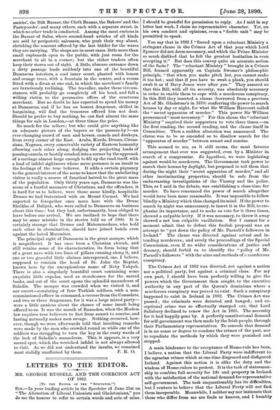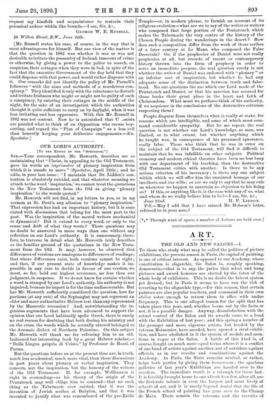LETTERS TO THE EDITOR.
M.R. GEORGE RUSSELL AND THE COERCION ACT OF 1882.
[To THE EDITOR 07 TEE " SPECTATOR."1 Sin,—In your leading article in the Spectator of June 21st on " The Alienation of Liberal Unionists and Gladatonians," you do me the honour to refer to certain words and acts of mine.
I should be grateful for permission to reply. As I said in my letter last week, I claim no representative character. Yet, on his own conduct and opinions, even a " feeble unit " may be permitted to speak.
You say that in 1882 I "forced upon a reluctant Ministry a. stringent clause in the Crimes Act of that year which Lord Spencer did not deem necessary, and which the Prime Minister so much disliked that he felt the greatest hesitation in even accepting it." But does this convey quite an accurate notion of the facts P The "reluctant Ministry " brought in a Crimes Bill, framed apparently on Captain Swosser's philosophic- principle, " that when you make pitch hot, you cannot make it too hot ; and that if you have to swab a plank, you should swab it as if Davy Jones were after you." They assured us that this Bill, with all its severity, was absolutely necessary in order to enable them to cope with a murderous conspiracy_ In this Bill they inserted a clause (borrowed from a previous Act of Mr. Gladstone's in 1870) conferring the power to search houses by day or night, for what Sir William Harcourt called the " secret apparatus of murder." This power Sir William pronounced "most necessary." For this clause the " reluctant Ministry " required their supporters to vote three times,—on the first reading, the second reading, and the clause itself in Committee. Then a sudden alteration was announced. The clause was to be so amended as to disallow search for the "apparatus of murder" between sunset and sunrise.
This seemed to me, as it still seems, the most fatuous arrangement that ever was suggested, even by a Minister in search of a compromise. Es hypothesi, we were legislating against would-be murderers. The Government took power to- search their houses by daylight, but proposed to tell them that during the night their " secret apparatus of murder," and all other incriminating properties, should be safe from the- embarrassing investigations of the Viceroy and the police.. This, as I said in the debate, was establishing a close-time for murder. To have renounced the power of search altogether would have been more reasonable. It was impossible to follow blindly a Ministry which thus changed its mind. If the power to• search by night was unnecessary, to insert it in the Bill, to em- phasise its importance, and to make us vote for it three times,. showed a culpable levity. If it was necessary, to throw it away showed a not less culpable vacillation. But I cannot for a. moment admit that to defeat this foolish proposal was an attempt to " put down the policy of Mr. Parnell's followers in Ireland." The clause was directed against actual and in- tending murderers ; and surely the proceedings of the Special. Commission, even if no wider considerations of justice and decency, should forbid us to identify the " policy of Mr_ Parnell's followers " with the aims and methods of a murderous conspiracy.
The Crimes Act of 1882 was directed, not against a nation nor a political party, but against a criminal class. For my own part, I should have been perfectly willing to give the- powers which the Government then sought, to the executive- authority in any part of the Queen's dominions where a murderous conspiracy was proved to exist. Such a conspiracy happened to exist in Ireland -in 1882. The Crimes Act was- passed ; the criminals were detected and hanged ; and ex- ceptional crime was so effectually stamped out, that Lord. Salisbury declined to renew the Act in 1885. The necessity for it had happily gone by. A perfectly constitutional demand for self-government was then made by the Irish people, through, their Parliamentary representatives. To concede that demand is in no sense or degree to condone the crimes of the past, nor to repudiate the methods by which they were punished and_ stopped.
A main hindrance to the acceptance of Home-rule has been,. I believe, a notion that the Liberal Party were indifferent to. the agrarian crimes which at one time disgraced and disfigured Ireland. Against this notion it is alike the duty and the- wisdom of Home-rulers to protest. It is the task of statesman- ship to combine full security for life and property in Ireland, with the satisfaction of the national demand for representative self-government. The task unquestionably has its difficultiea, but I venture to believe that the Liberal Party will not find, them insuperable. Meanwhile, I neither say nor insinuate that those who differ from me are fools or knaves, and I humbly
request my kinsfolk and acquaintance to restrain their polemical ardour within like bounds.—I am, Sir, &c., GEORGE W. E. RUSSELL.
18 Wilton Street, S.W., June 24th.
[Mr. Russell states his case, of course, in the way that is most advantageous for himself. But our view of the matter is that the question in 1882 was whether it was or was not desirable to irritate the peasantry of Ireland, innocent of crime or otherwise, by giving a power to the police to search, on suspicion, their cottages when they were in bed, in spite of the fact that the executive Government of the day held that they could dispense with that power, and would rather dispense with it. Our remarks did not identify the policy of Mr. Parnell's followers " with the aims and methods of a murderous con- spiracy." They identified it only with the reluctance to disturb and irritate Irishmen who might or might not be guilty of such a conspiracy, by entering their cottages in the middle of the night, for the sake of an investigation which the authorities -thought it quite sufficient to carry on by daylight, when it was less irritating and less oppressive. With this Mr. Russell in 1882 was not content. Now he is astonished that U' ..onists are puzzled what to think of an Opposition who excuse boy- cotting, and regard the "Plan of Campaign" as a less evil than honestly keeping your deliberate engagements.—En. Spectator.]



















































 Previous page
Previous page